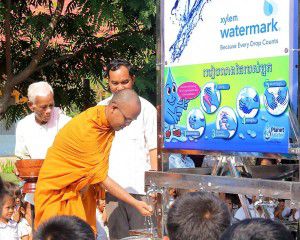Aqua Towers Provide Fresh Water to the World’s Most Remote Impoverished Communities
Published on by Water Network Research, Official research team of The Water Network in Non Profit
A small group of the Planet Water Foundation team were in the Dominican Republic, when one asked “How long do you think it would take to build a single AquaTower?”
Since first developing their AquaTowers in 2008, the Planet Water Foundation had completed some 700 projects and their staff had become so good at building the water filtration systems, that they estimated they could build one with the right team in approximately one hour.
If we can do one in an hour, we could do 24 in a day! they concluded.
With World Water Day, March 22nd, the United Nation ‘s effort to focus the world’s attention on water issues coming up, the team quickly decided to meet the challenge of building 24 AquaTowers in five countries in 24 hours, an effort which came to be called Project 24.
Project 24 is just one of the special inspirational moments that Planet Water has experienced. Perhaps the most important for the founders, Mark Steele and Nick Hill , in their early days was the partnership with JPMorgan Chase , the U.S. investment bank.
Having funded the charity with their own money, they were acutely aware that they would need support from corporations and other foundations if they were to make their organization sustainable over the long term and help as many people as they possibly could.
Formerly senior executives in separate billion dollar divisions of the mega-corporation ITT for more than 20 years, they would reach out to top executives from large corporations whom they thought would have an interest in supporting their burgeoning 501c3 nonprofit organization.
JPMorgan Chase ‘s senior executives responded to their outreach and after a number of meetings decided to create their Asia Water-for-Life program in partnership with the foundation.
“JPMorgan gives a tremendous amount of money to charities through its foundation but, at that time, they didn’t have a program centered around water” Mr. Hill told Global Atlanta. “However with our subsequent grant we had to quickly demonstrate the organizational capacity to deploy 100 water filtration systems along with our education and sustainability programs across five countries in Asia,” he said.
Mr. Hill added that in the early days he and Mr Steele were worried that they did not have the experience of other NGO’s in the water space, but quickly learned that while there were an abundance of talented executives in the nonprofit sector, there was a shortage of business oriented professionals who knew how to manage organizations efficiently and develop cost effective and technology appropriate solutions.
Once their organization had scaled-up to meet the demands of a multi-country roll-out, Planet Water was able to more effectively target large corporations such as Starbucks , Timberland and the Coca Cola Co. , which were interested in providing safe drinking water and hygiene education to people in remote and water stressed communities.
Mr. Steele’s and Mr. Hill’s inspiration for the change in their careers from corporate executives to the nonprofit sector dates back to the 2004 and the undersea mega-thrust earthquake in the Indian Ocean that triggered a series of devastating tsunamis resulting in the deaths of hundreds of thousands of people in 14 countries.
Like many other corporations with Asian operations, ITT joined the relief effort providing pumping and filtration systems to the affected areas and those efforts were acknowledged by former U.S. presidents Bill Clinton and G.W. Bush who were touring the region and visited ITT’s relief operation in Sri Lanka .
The executives were deeply affected by the crisis and realized that while the tsunamis dramatically underscored the water crisis in Asia the problem of water poverty in the region was far more widespread. United Nations research shows that every year more people die from unsafe water than from all forms of violence, including war.
With the support of their CEO, Steven Loranger , ITT Corp. started it’s own signature corporate social responsibility program called Watermark with the mission of providing and protecting clean water in communities around the world. Three years later Mr. Loranger decided to transform ITT into three, standalone publicly traded companies that concluded with the spinoffs of Xylem Inc. , a water technology company, and Exelis Inc., an aerospace, defense and information solutions company.
Xylem retained the Watermark program after the spinoff and soon joined forces with Planet Water to provide clean water and hygiene education to communities throughout China , India , the Philippines , Cambodia , and Colombia .
The partners have completed more than 200 water towers together, bringing clean, safe water to almost a quarter of a million people mostly children suffering serious waterborne diseases.
The Planet Water Foundation is responsible for assembling hundreds of towers similar to this one in the most remote regions
Additionally more than 700 Xylem employee volunteers have joined the foundation in the field to build water towers and provide sanitation and hygiene education to schools in the poorest regions of Asia.
Even before they partnered with Xylem, Planet Water was focused on Asia with which the founders were familiar through their time at ITT when Mr. Steele ran the company’s Asian operations.
“We focused on Asia because it was less well served by the water NGOs than other regions of the world such as Africa,” Mr. Hill said. “Asia has some of the worst water contamination issues in the world and, while the region often has plenty of water, much of it is undrinkable and requires filtration solutions such as ours.”
Source: Global Atlanta
Read More Related Content On This Topic - Click Here
Media
Taxonomy
- Non Profit
- Water Supply
- Water Management